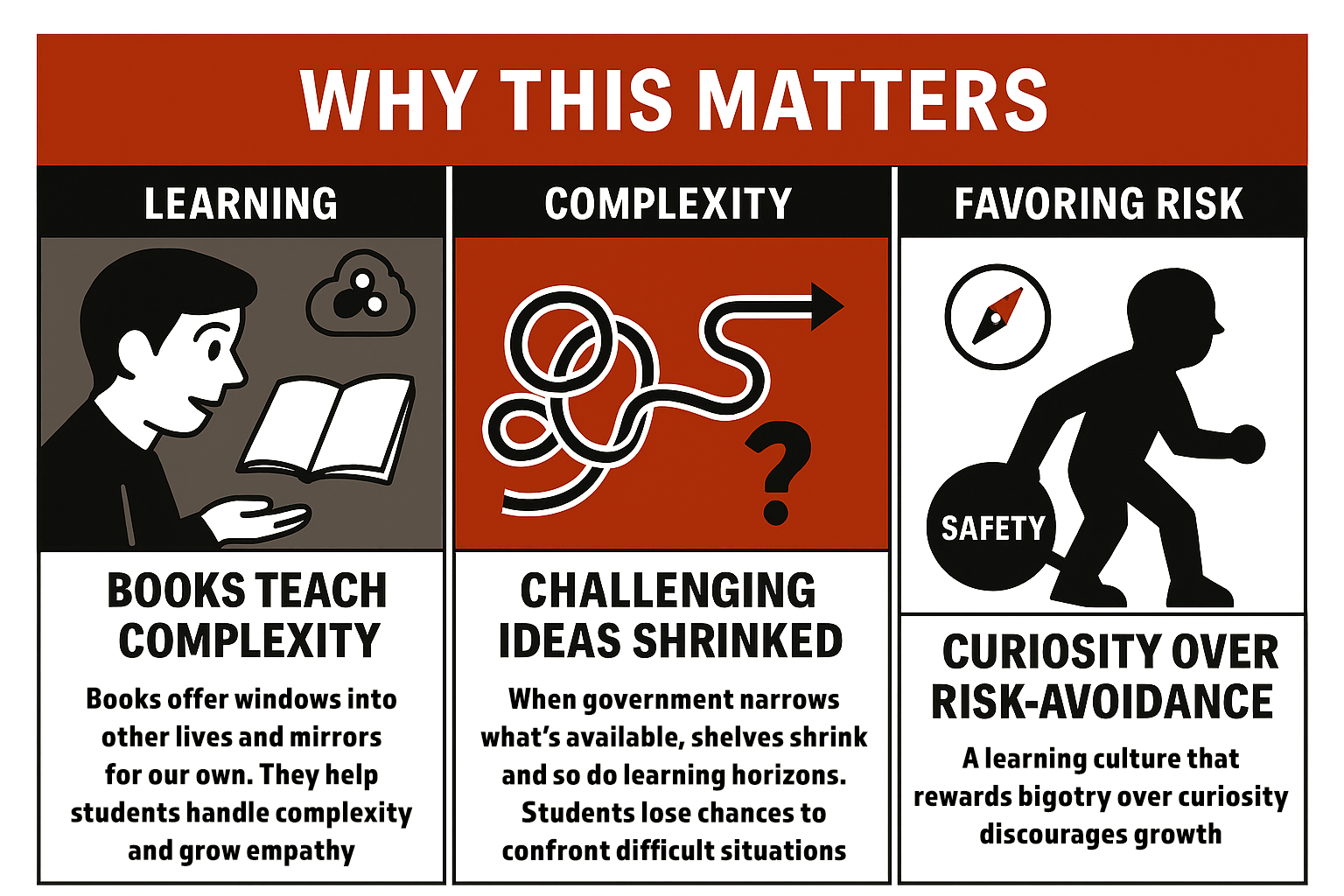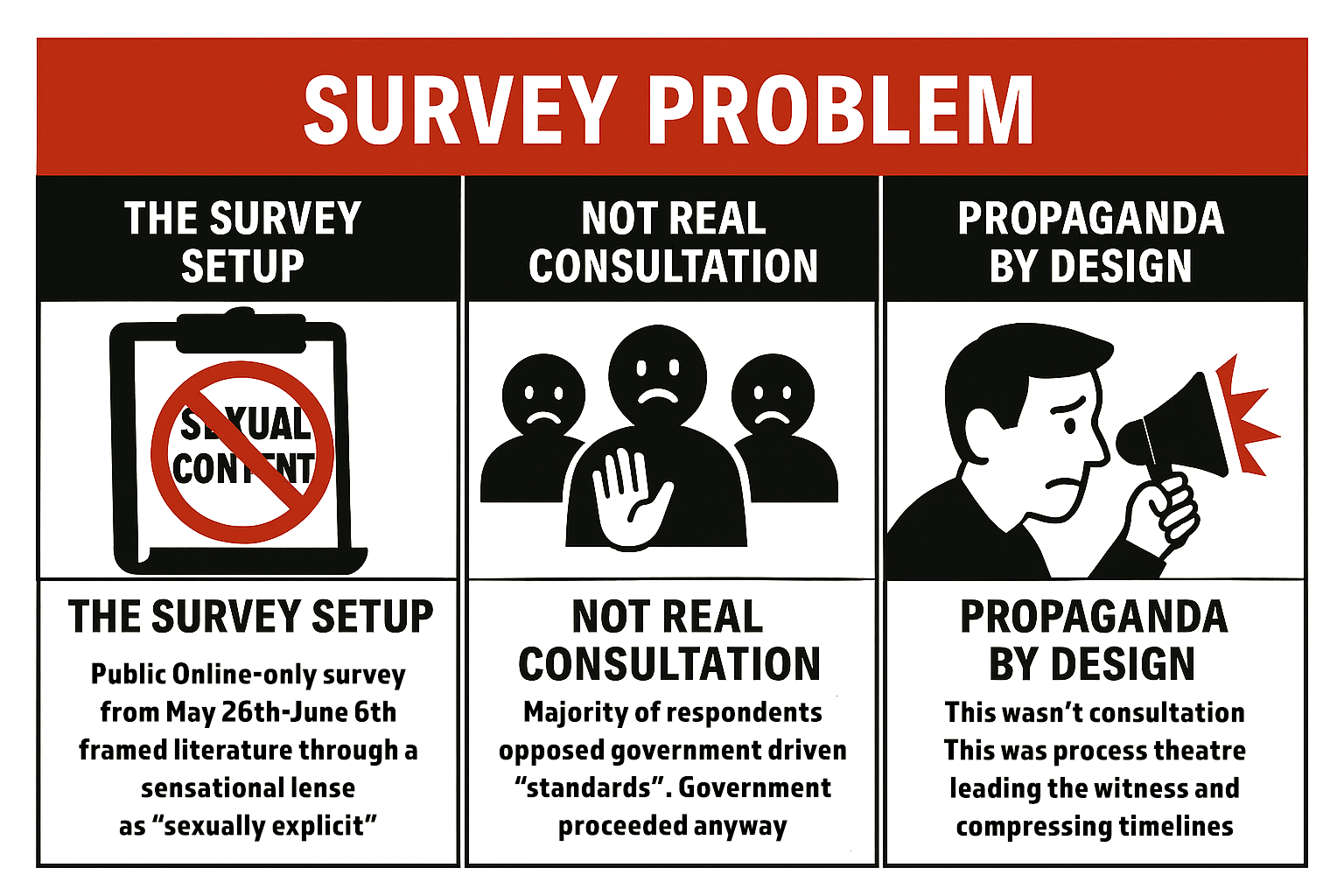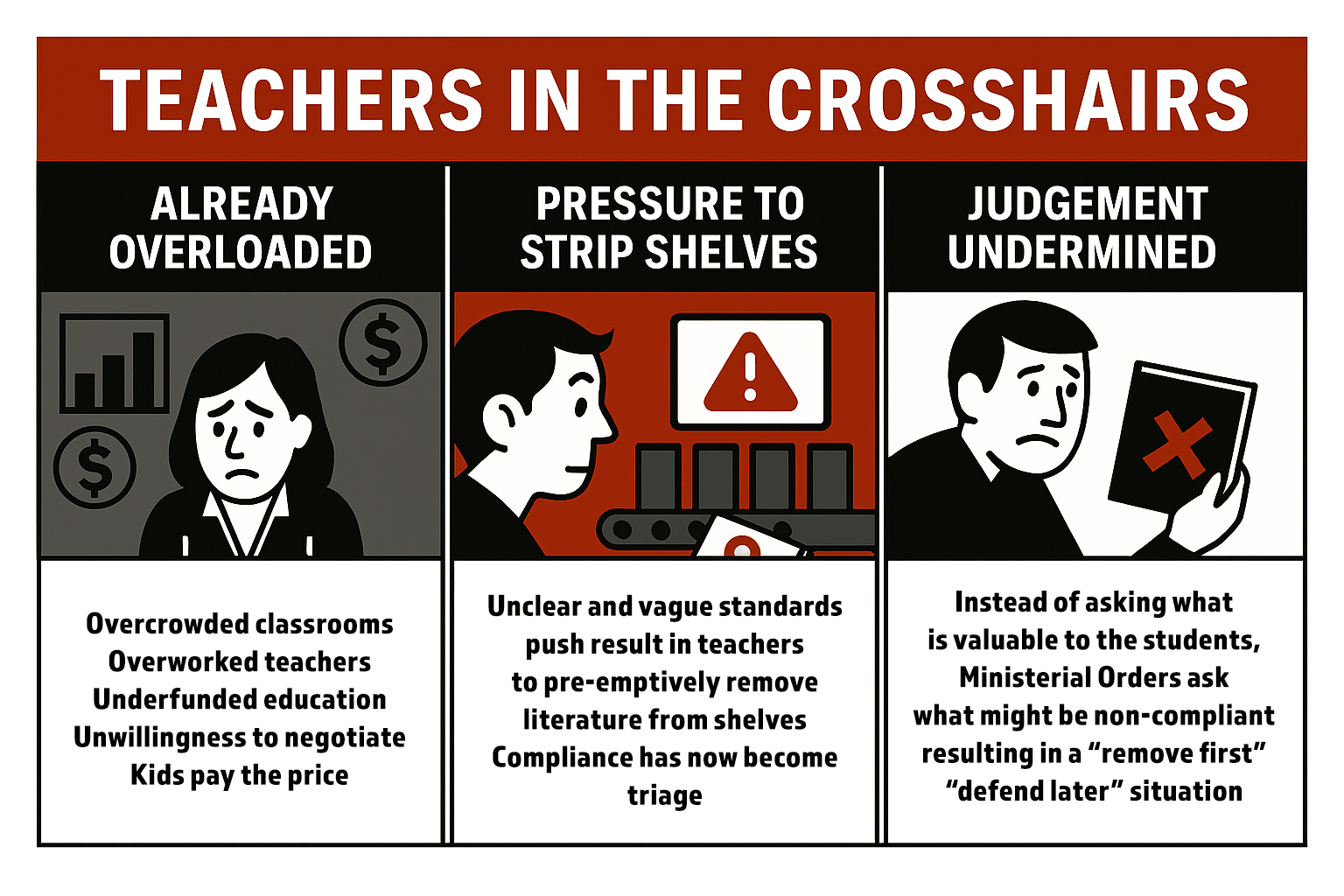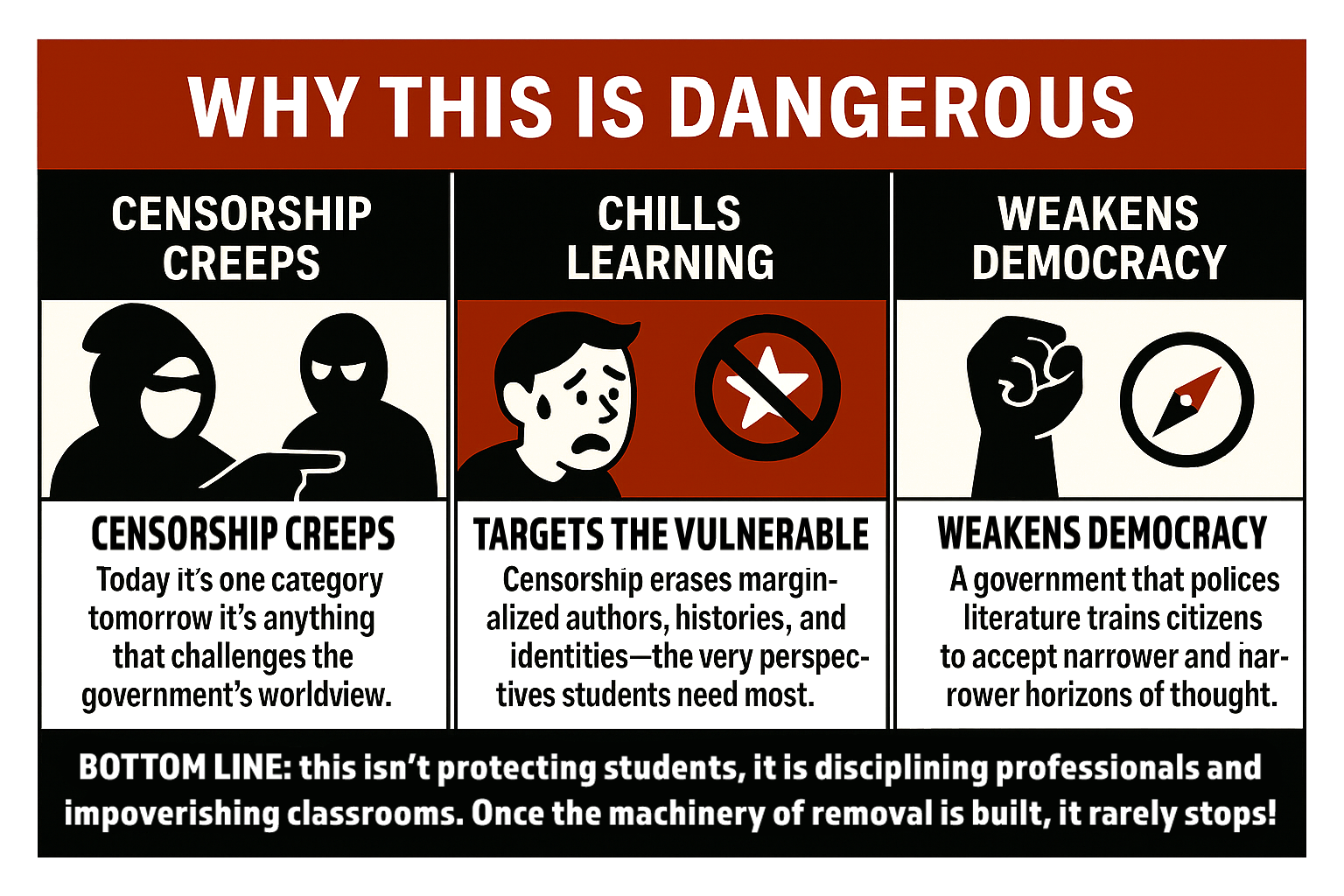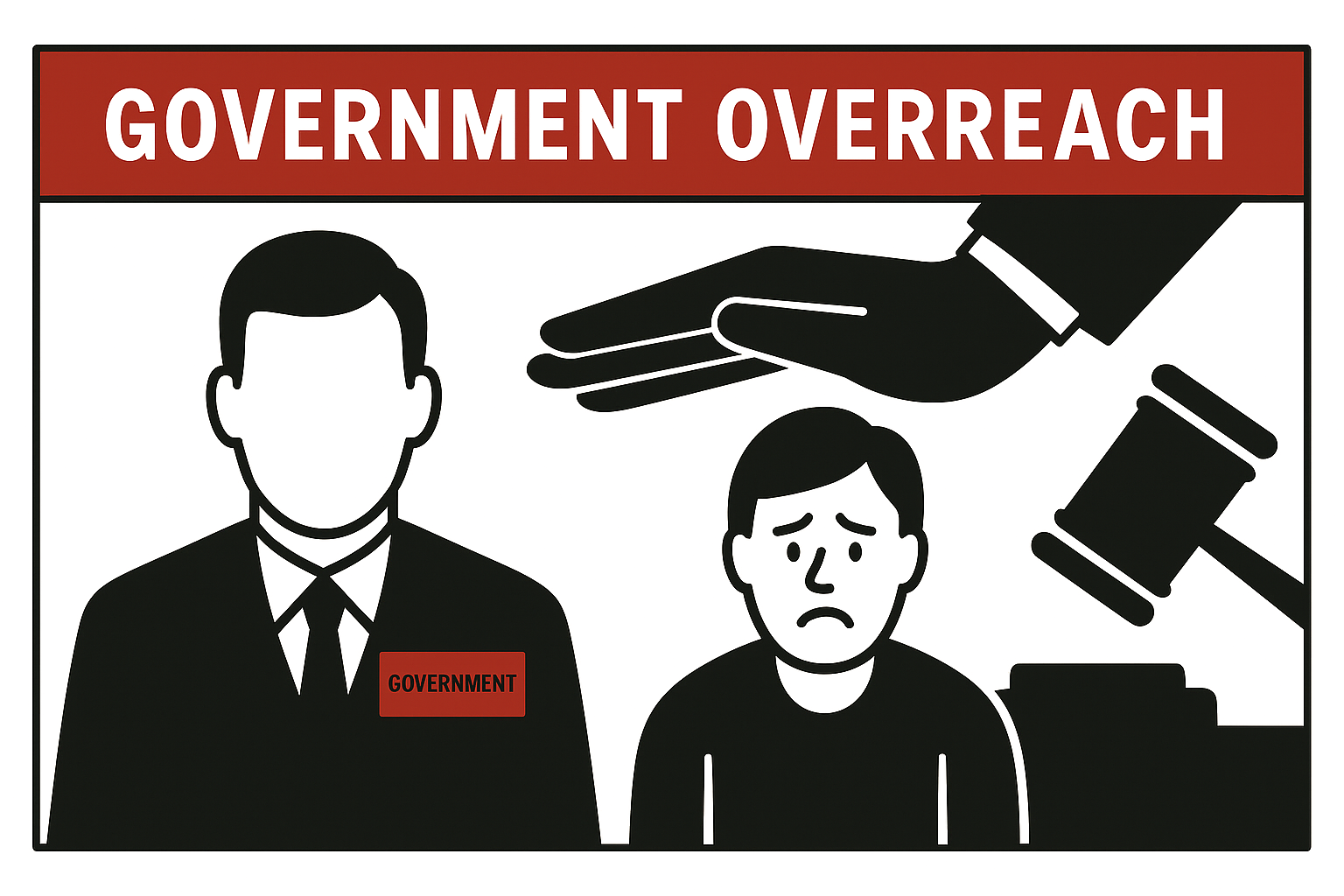MINISTERIAL ORDER 030/2025
REPLACED BY 034/2025
Ministerial Order #030/2025 has now been replaced by Ministerial Order #034/2025 (Sept 8, 2025). The revision narrows the ban to “explicit visual depictions of a sexual act” and delays full implementation to January 5, 2026—but it still centralizes control over school collections, mandates province-wide compliance work, and keeps the Minister in the loop on what gets pulled. A rewrite doesn’t fix the core problem: a top-down regime that puts politicians in charge of what students can access. We oppose that overreach on principle. Professional educators, librarians, and local communities are best placed to select age-appropriate materials; government directives chill learning, narrow viewpoints, and reliably target marginalized voices. Whether the order is sloppy or “clarified,” the effect is the same—state control over shelves and classrooms. We call for abandoning censorship-by-decree and restoring trust in professional judgment, transparent processes, and student access to diverse, challenging books.
Books teach students how to handle complexity. They offer windows into other lives and mirrors for their own. When a government narrows what’s available, it doesn’t just shrink shelves—it narrows horizons. The cost is real: fewer chances to confront challenging ideas, fewer tools to evaluate claims, and a school culture that rewards risk-avoidance over curiosity.
In Alberta, what’s being sold as “clarity” and “standards” continues to function as a censorship regime: the state decides which themes are too sensitive for everyone, and educators must enforce that across grades and contexts. That’s the opposite of professional judgment and parent–school partnership. And once a state asserts the right to police literature on one axis, it becomes easier to expand the target list to others—identity, politics, history. Book bans—no matter how framed—are a democratic red flag.
034/2025 repeals 030/2025 and narrows scope to explicit visual depictions of a sexual act (with a carve-out for non-narrative technical/reference materials). Boards must:
Maintain a public list of school literary materials (separate from classroom collections).
Notify parents about items included in each classroom collection.
Submit a list of materials they intend to remove to the Minister by Oct 31, 2025.
Update policies and processes by Jan 5, 2026.
In practice, that means system-wide audits, documentation, and continuing reviews under provincial rules. The wording is tighter than 030/2025, but the structure is unchanged: centralized standards, compliance paperwork, and upward reporting that puts political considerations in the middle of school-library work.
Before imposing these rules, the province ran a short, online-only consultation framed around “materials with sexual content.” That framing primed responses and compressed meaningful participation. The government then presented the survey as validation for centralized standards rather than an open test of public appetite for local, professional decision-making. This is process theater: lead the witness, then cite the answers. When consultation design narrows focus to a single sensational axis and rushes timelines, the output reflects the script more than the public will. Using that output to justify province-wide bans and reporting undermines trust and predictability—and raises obvious concerns about fairness, rights, and whether evidence or politics is steering education policy.
Even with narrowed scope, 034/2025 adds heavy administrative load: building public catalogues, issuing classroom notices, preparing removal-intent lists, rewriting policies, and sustaining ongoing reviews. In crowded classrooms with scarce prep time, the rational response becomes over-removal—not because educators believe titles are harmful, but because the risk of complaints outweighs the benefit of keeping a book. That flips the question from “What helps students learn?” to “What keeps us safest under shifting political rules?” The result is fewer acclaimed, age-appropriate works within reach, less time for teaching, and more time on compliance. This doesn’t protect students; it disciplines professionals and hollows out the library as a space for exploration.
Censorship creeps: Today “explicit visuals”; tomorrow, broader themes and topics.
Chilling effect: Politicized rules nudge schools to pre-emptively remove materials.
Democratic cost: State-managed reading normalizes narrow horizons of thought.
Disproportionate harm: Marginalized authors and histories vanish first.
Schools work best when educators are trusted to balance age, context, and pedagogy—openly and locally—not when they’re micromanaged by ministerial edict. Protect learning by protecting professional judgment and student access to a wide range of ideas.
Rescind 034/2025 and halt removals.
If guidance is needed, co-create neutral standards with educators, librarians, literacy experts, and communities.
Transparency: clear criteria, public lists, public rationale—no political fishing expeditions.
Invest in learning: smaller classes, more supports, stronger libraries—not paperwork.
Respect labour: compensate mandated review time; stop the churn.
Stay in your lane: defining “pornography” for schools is not a political function; selection belongs to professional practice and local governance grounded in evidence, curriculum, and community values.

